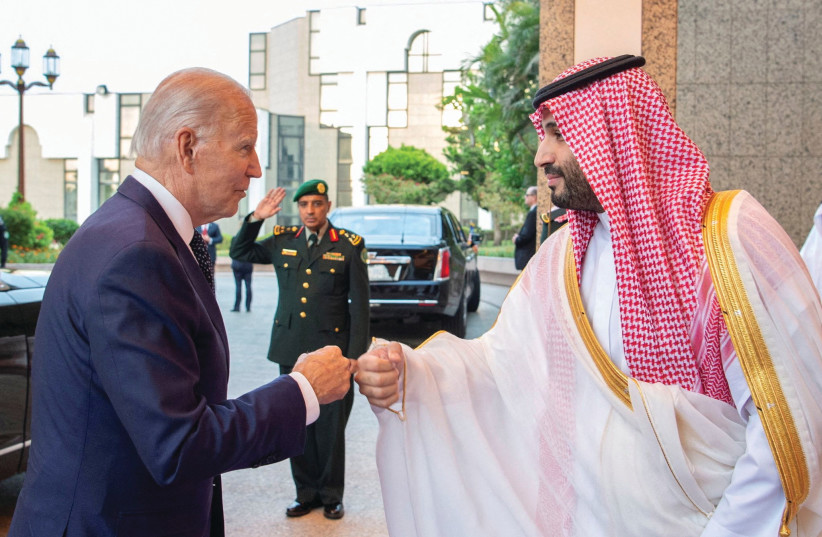Saudi Arabia’s decision to grant Israeli airlines the right to fly through its airspace is not a step in the direction of normalization, the country’s deputy ambassador to the UN Mohammed Al-Ateeq said.
“The decision to allow the use of our airspace to all airlines is in line with our international obligations,” Ateeq told the UN Security Council on Tuesday during its monthly meeting on the Israeli-Palestinian conflict.
“This step will not be a prelude to other steps,” he said.
Earlier this month, Saudi Arabia stoked Israeli hopes of warming ties between the two countries, with its decision to open its skies to Israeli planes.
It announced the change as US President Joe Biden made history as the first American president to fly directly from Israel to Saudi Arabia. During his visit to Jeddah, Biden met with members of the Gulf Cooperation Council, including Bahrain, Kuwait, Oman, Qatar, Saudi Arabia and the United Arab Emirates as well as with Egypt, Jordan and Iraq, to discuss a regional security architecture.

During his trip to the Middle East from July 13-16, Biden touted the region’s growing acceptance of Israel. After his departure, however, Saudi Arabia clarified that a resolution to Israel’s conflict with the Palestinians based on the parameters of the 2002 Arab League Peace Initiative was a prerequisite to such ties.
“The decision to allow the use of our airspace to all airlines is in line with our international obligations.”
"The decision to allow the use of our airspace to all airlines is in line with our international obligations."
Saudi ambassador to the UN Mohammed Al-Ateeq
Saudi Minister of State for Foreign Affairs Adel al-Jubeir told CNN that his country supports the 2002 initiative, noting that “we authored it” and “we have made it clear that peace comes at the end of this process, not at the beginning of it.”
Saudi Arabia “is committed to a two-state settlement with a Palestinian state in the occupied territories with east Jerusalem as its capital – that is our requirement for peace: That has not changed. We have taken positions and made it clear that peace with Israel is possible.”
At the UNSC on Tuesday, Ateeq said the “kingdom will continue to stand with the Palestinian people” and that this “would not change even if we allow the crossing of international flights over our airspace.”
Earlier in the meeting, US Ambassador to the UN Linda Thomas-Greenfield spoke of the importance of the kingdom’s decision to grant Israel overflight rights.
“Saudi Arabia’s announcement that it would allow Israeli airlines to use Saudi airspace was another important step in building a more integrated region,” she said.
Israel’s Ambassador to the UN Gilad Erdan also spoke hopefully of the future with the kingdom.
“Israel is looking forward to further developments with Saudi Arabia.”
